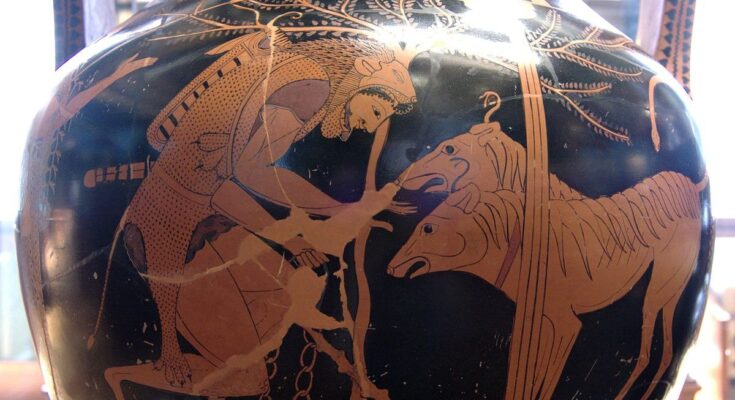The mythical Greek hero Heracles is most famous for his twelve labors. However, he also engaged in many other exploits. One of these, supposedly, was founding the Olympic Games. This surprising claim is quite ancient. What exactly does this legend entail, and is there any evidence that Heracles really did establish the Olympic Games?
Pindar, Heracles, and the Olympic Games
The earliest reference to a connection between Heracles and the Olympics comes from Pindar. He was a Greek poet active in the early fifth century BCE. Pindar was actually the first writer to mention anything about how the sporting festival began.
Pindar does not simply refer to Heracles in passing. Rather, he repeatedly refers to the supposed fact that Heracles established the Olympic Games. This statement appears at various times in his writings, and Pindar describes the process in great detail. For example, at one time, he wrote:
“The brave son of Zeus [that is, Heracles] gathered the entire army and all the spoils together in Pisa and measured out a sacred precinct for his supreme father. He enclosed the Altis all around and marked it off in the open, and he made the encircling area a resting-place for feasting…And he called it the Hill of Cronus.”
This describes Heracles establishing the specific site where the Olympic Games were to be held, the Hill of Cronus. Pindar then went on to mention “how he [Heracles] established the four years’ festival with the first Olympic games and its victories.”
The chronological complications of Heracles
A keen student of Greek history and mythology might have already noticed an apparent issue with this legend. The traditional date of the founding of the Olympic Games is 776 BCE.
On the other hand, Greek records consistently place Heracles about two generations or so before the Trojan War. The traditional date of the Trojan War places it in the twelfth century or about 1200 BCE. This would mean that Heracles lived centuries too early to have had anything to do with the Olympics.
Once that traditional date of the Trojan War had become firmly established among the ancient Greeks, it appears that some writers realized the issue and tried to explain it away. For instance, Pausanias, centuries after Pindar, described Iphitos the king of Elis as “restoring” the Olympic Games.
This would allow Heracles to have been the original founder of the Olympic festival while also preserving the traditional starting date of the games.
The earliest evidence
Nevertheless, there is no hint of this later version in Pindar’s much earlier account. Everything indicates that Pindar believed Heracles founded the Olympics, which had continued uninterrupted down to his own time. It is very important to note that Pindar’s account of the origin of the Olympic Games is the earliest one.
However, this does not present an issue. In fact, when we look at the earliest information about Heracles, we see it is consistent with Pindar’s claim about who founded the Olympic Games.
The earliest direct chronological information about Heracles comes from Herodotus. He placed the legendary hero after the time of Cadmus, who brought the Phoenician alphabet to Greece. Archaeology shows this happened in the ninth century BCE.
Furthermore, Herodotus also tells us that King Perdiccas I of Macedon was a fifth-generation descendant of Heracles. Since we know that Perdiccas I reigned in the seventh century BCE, that would place the birth of Heracles probably around 800 BCE.
Did Heracles really establish the Olympic Games?
This does not necessarily mean that Heracles was a real person. However, it does show that, in people’s earliest beliefs about him, he was evidently imagined to have lived in the early eighth century BCE. It was only in later records that he was placed in a much earlier period of Greek history.
What can we conclude on the basis of this evidence? Well, what we can see is that the earliest available information about the origin of the Olympic Games is actually consistent with the earliest available information about the chronology of Heracles.
This means that Heracles could theoretically have been the founder of the Olympic Games. At the very least, he would have lived in the era in which those games were founded. Whether he actually founded them or not is simply impossible to say.
However, given that Pindar preserves the very earliest beliefs about the origin of this sporting festival, it does seem reasonable to conclude that the historical figure behind Heracles may well have had at least something to do with the founding of the Olympic Games.



